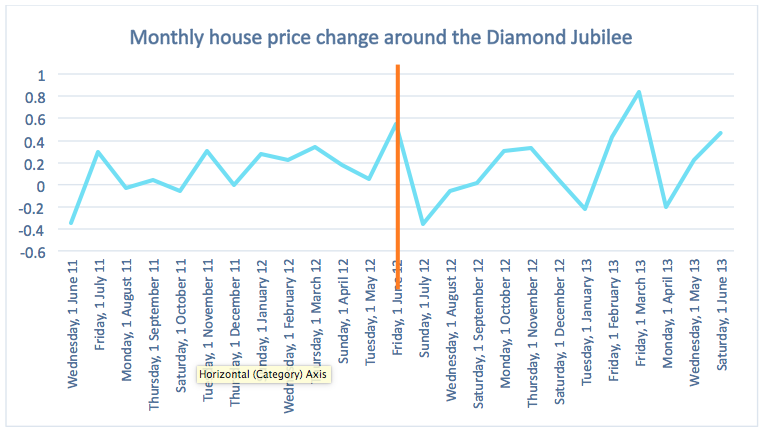The public has a long-held fixation with the Royal Family. This has meant that significant royal events – weddings, jubilees, and births – are often reported by economists to provide a temporary boost to consumer spending and confidence across the country, with effects acutely felt in popular tourist areas. An increase in consumer confidence and extra day-to-day spending is one thing, but do large and publicly visible Royal events have any impact on house prices in England and Wales? With Prince Harry marrying Megan Markle later this month, here is a quick run-down of house price changes in the two-year period around previous Royal occasions.
Wedding of Duke and Duchess of Cornwall
When Prince Charles married Camilla in June 2001, there was no discernible effect on either monthly or annual house price changes. House price growth was healthy during this period, so a slight positive uptick would not be noticeable within the data. In the Queen’s Golden Jubilee year (2005), the main weekend of celebrations fell in April, where there was only a small interruption in the overall trend during April (where price growth was a little lower) and May (where the market appears to have corrected and growth was a little higher). These two events, however, do not suggest any significant effect.
But considering these are 17 and 13 years old respectively, and with the interest in the Royals increasingly significant in recent years, more contemporary occasions and celebrations may suggest something different.
Wedding of Duke and Duchess of Cambridge
The wedding of William and Kate, in May 2011, had a noticeable impact on monthly house changes, although not in the positive way many would expect. House prices were relatively flat over the 12 months before the wedding – averaging a small 0.07% fall – and after – averaging modest 0.1% growth. During the month of May, however, prices fell 0.8% compared to the previous month.
Queen’s Diamond Jubilee
The main celebrations of the Queen’s Diamond Jubilee happened in June 2012, during a period of relatively low consumer confidence. Notwithstanding, this month saw a spike in monthly house price growth to 0.55%, higher than any point during the previous 12 months, but a month later prices fell by 0.35%, perhaps indicating a slight readjustment in the market.
Royal births
The recent births of Prince George (June 2013) and Princess Charlotte (May 2015) have not had a significant impact on change in house prices across the country, perhaps because they were slightly smaller and lower profile occasions, without a long lead up time and as large an economic boost within the wider economy. Only an extremely ardent monarchist, it seems, would allow a birth of a future King to press them into buying a home.
Royal occasions influence on housing market
So how much of these effects can we place as a direct result of any ‘Royal event’ effect? It is hard to tell – larger scale and longer-term effects usually mask smaller divergences from trends at the national level. Isolating the potentially small effect of these important Royal occasions is difficult, not least because of the many other moving parts that affect the housing market. Factors such as interest rates, mortgage credit availability, and wider economic trends and confidence are likely to be more important factors behind decisions to purchase a home. Seasonal effects are also worth considering – weddings and jubilee celebrations have occurred in the spring and summer months, when the housing market traditionally picks up. As one of many factors that affect individual decisions to purchase a house, and relatively few data points (which are somewhat volatile anyway) to go on, we cannot say for sure what the impact of weddings, celebrations and births is.
Given the current cooling housing market and continued economic uncertainty, Harry and Megan’s wedding faces a tough task to have a noticeable positive impact on the country’s housing market. Cooling transaction levels, a reduction in foreign investment, and stalling prices are likely to have a much larger overall impact. Any effect – if noticeable – will also take many months to become apparent in the data.
Perhaps the most we can hope for is that Harry and Meghan decide to buy a ‘doer-upper’ and, like so many young couples, spend their weekends dreaming of loft extensions and bi-fold doors.
Tom Colthorpe is a researcher at Centre for London, the capital’s dedicated think tank. Alongside a broad engagement with a range of issues relating to urban policy and politics, his research interests particularly focus on the residential property market, including affordable housing and the private rental sector. Follow him on Twitter @tom_colthorpe.



